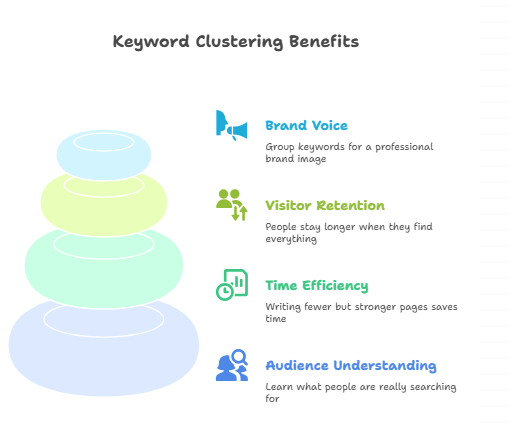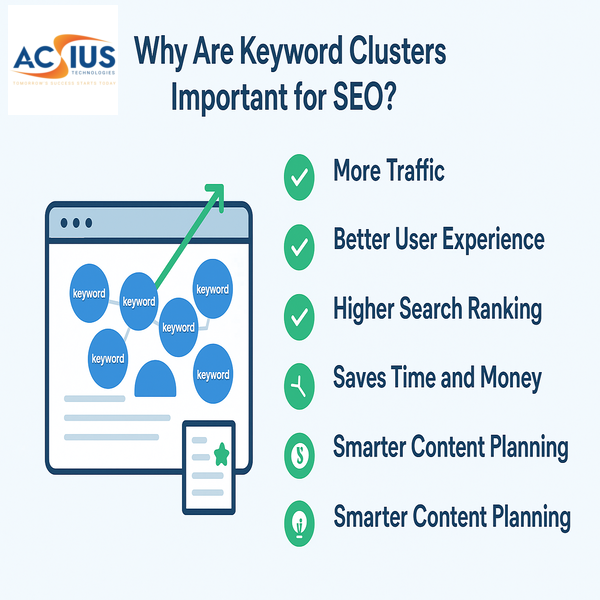Can you imagine your website getting more visitors—not by focusing on just one keyword, but by using many? That’s what keyword clustering does. At ACSIUS, we teach this smart SEO method because it works better than guessing or using random keywords.
What if one webpage could show up in search results for many different search terms? That’s powerful, right? Let’s learn how keyword clusters can boost your website traffic.
- What Is a Keyword Cluster in SEO?
- How Does Keyword Clustering Work?
- Why Are Keyword Clusters Important?
- Keyword Clustering Example
- About ACSIUS
- FAQ About Keyword Cluster in SEO?
- What is a keyword cluster in SEO?
- Why are keyword clusters important for SEO?
- How do I create keyword clusters?
- How many keywords should be in one cluster?
- Can one page rank for multiple keywords?
- Does keyword clustering work for all types of websites?
- How often should I update my keyword clusters?
- Can keyword clustering improve my website’s user experience?
What Is a Keyword Cluster in SEO?
A keyword cluster is a group of similar keywords that people use to search for the same thing.
For example:
- “weight loss diet plan”
- “best diet for weight loss”
- “healthy weight loss meal”
These phrases are different, but they all mean one thing: people want help with losing weight through diet. Instead of writing three different pages, you can write one helpful page that covers them all.
How Does Keyword Clustering Work?
Wondering how websites know which keywords to group together? Here’s how:
- Research keywords: Find phrases people are searching for.
- Check results: If the same websites appear for multiple phrases, the intent is the same.
- Write one page: Create a page that includes all the keywords with the same goal.
This way, you get more traffic from several keywords, not just one. It’s a smart and efficient strategy.
Why Are Keyword Clusters Important?

Here are the main reasons why keyword clusters are great for SEO:
- ✅ More traffic: Small keywords might not bring much traffic alone, but together, they do.
- ✅ Better user experience: People find everything they need on one page.
- ✅ Higher search ranking: A page with many useful keywords ranks better.
- ✅ Saves time and money: No need to write 10 pages when one good page works.
- ✅ Smarter content planning: Helps you understand what your audience wants.
Let understand this with Image

1. More SEO Power
Instead of trying to rank for one keyword, you rank for many. Your page becomes more useful and trusted.
2. Keeps Visitors on Your Site
People stay longer when they find everything they need. This increases your chances of turning visitors into customers.
3. Use Your Time Wisely
Writing fewer but stronger pages saves time. You don’t need to write a page for every keyword.
4. Understand Your Audience
Clusters help you learn what people are really searching for. This helps you plan better content in the future.
5. Clear and Strong Brand Voice
When you group keywords and focus your message, your brand looks more professional and reliable.
Keyword Clustering Example
Let’s say your website offers digital marketing services, like SEO, content writing, and PPC. You want to write a blog about SEO strategy.
🔍 Step 1: Choose Your Main Keyword
- Main keyword: “SEO strategy”
It’s a popular term but very competitive.
📚 Step 2: Find Related Keywords
Look for similar terms that mean the same thing. For example:
| Related Keyword | What the User Wants |
| how to create an SEO strategy | A step-by-step guide |
| best SEO strategy for 2025 | Up-to-date advice |
| SEO content strategy | Content-focused help |
| example of SEO strategy | Real examples |
| simple SEO strategy for beginners | Easy tips |
These all mean: “I want to learn how to make an SEO strategy.”
✍️ Instead of 5 Blogs, Write 1 Great Post
Blog Title: “How to Build an Effective SEO Strategy in 2025 [With Examples]”
Blog Outline:
- Introduction
- What is an SEO strategy? (targets: “what is SEO strategy”, “simple SEO strategy”)
- Why SEO is important in 2025 (targets: “best SEO strategy for 2025”)
- Step-by-step guide
- Content planning for SEO (targets: “SEO content strategy”)
- Real examples (targets: “example of SEO strategy”)
- Mistakes to avoid
- Conclusion with a call to action
This way, your blog targets 5–10 keywords at once. That’s smarter than writing one blog per keyword.
Keyword clustering is not a trick—it’s a smart way to do SEO. Instead of writing many weak pages, create one strong one that covers everything.
At ACSIUS, we believe in smart strategies that save time and get real results. With keyword clusters, your content ranks better, brings more traffic, and gives your readers exactly what they need.
About ACSIUS
ACSIUS is a trusted digital marketing company that has been helping businesses grow online since 2010. We offer a wide range of services, including:
- SEO (Search Engine Optimization)
- Local SEO
- Website Development
- Website Designing
- Social Media Marketing
- Other Digital Marketing Services
Our team is experienced in creating smart strategies that bring real results. Whether you need a strong online presence, better search rankings, or a user-friendly website, ACSIUS is here to help. We focus on quality, results, and long-term success for our clients.
FAQ About Keyword Cluster in SEO?
Why are keyword clusters important for SEO?
Keyword clusters help improve your search rankings by targeting multiple related terms on one page. This increases traffic, improves user experience, and boosts your site's authority.
How do I create keyword clusters?
To create keyword clusters:
- Choose a main keyword.
- Find related keywords with similar intent.
- Group them together.
- Write content that covers all of them naturally.
How many keywords should be in one cluster?
There’s no fixed number, but most clusters include 5–10 related keywords. The key is that they all share the same intent and can be covered in one helpful page.
Can one page rank for multiple keywords?
Yes! That’s the goal of keyword clustering. A single well-optimized page can rank for many keywords if they are closely related and the content is useful.
Does keyword clustering work for all types of websites?
Yes! Keyword clustering can help any website—from blogs to e-commerce sites—by organizing keywords and improving content relevance to attract more visitors.
How often should I update my keyword clusters?
It’s good to review and update your keyword clusters every few months. Search trends change, so refreshing content helps keep your rankings strong and relevant.
Can keyword clustering improve my website’s user experience?
Absolutely! When you group related keywords and provide all information in one place, visitors find what they need faster, which makes them stay longer and trust your site more.





